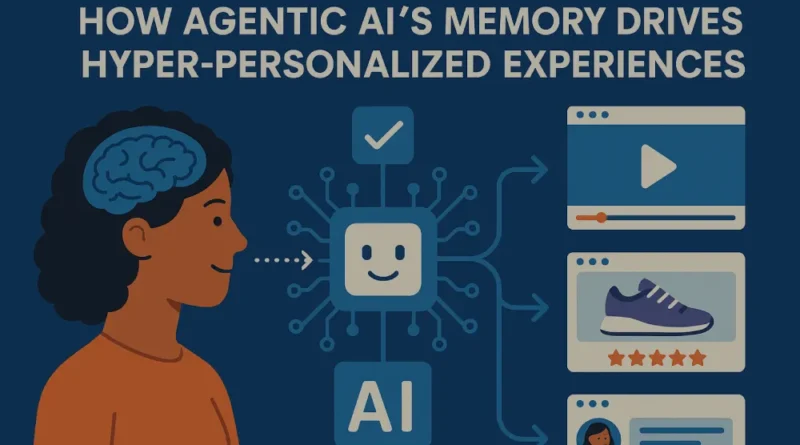How Agentic AI’s Memory Drives Hyper-Personalized Experiences
Introduction
The agentic AI has become one of the revolutionizing concepts of artificial intelligence and has been transforming the way businesses provide customers with a unique experience. Unlike conventional AI, which responds to fixed inputs, agentic AI uses memory to play and learn on its own, and to personalize dialogue to preferences in real time. In 2025, 64 percent of firms that leverage AI in consumer outreach consider it considerably more effective in terms of personalization, and agentic AI memory will contribute to the trend (Salesforce, 2025). This article is about how memory systems that are present within agentic AI: they are short-term, long-term, episodic and semantic memory systems to make hyper-personalized experience addressing special needs of each individual customer such as to present unique insights, locally contextualized, and credible data that have value to marketers and others with tech fascination.
What is Agentic AI and Memory?
Agentic AI means autonomous systems that involve goal-setting, decision-making, and environmental responsiveness that are not continuously monitored by human hands. In contrast to generative AI, which is about content generation, agentic AI is more concerned with decision-making and carrying out tasks (IBM, 2025). Such autonomy is supported by the most critical element of the process memory, which allows AI to memorize and retrieve prior interactions as well as using them to provide personalized and context-aware results.
Types of Agentic AI Memory
- Short-Term Memory (STM): Deals with immediate jobs, it stores context within one task. As an instance, the chatbot will store an earlier inquiry of a user about a question about sustainable fashion, which will help it answer coherently (IBM, 2025).
- Long-Term Memory (LTM): It preserves information amongst sessions; thus enabling AI to remember user preferences in the long-term. This is important to personalization like the example of an AI assistant of a retail store remembering the size or fashion style of a customer (Growth Jockey, 2025).
- Episodic Memory: It records particular events, so the AI could learn from previous encounters. As an example, a user could remember that she had been fighting with a product feature to bring it up with a specific user when they needed assistance (Medium, 2025).
- Semantic Memory: Facts; stores and provides data, such as product information or trends in an industry, to be used by reasoning and recommendations (IBM, 2025).
Special Insight: Agentic AI also has a memory that resembles human thinking in combining both STM, a short-term capability of remembering the immediate context, and LTM, a long-term one, of remaining personal. This memory resembling the human memory enables AI to create long-term connections with the users, ceasing to be transactional.
How Memory Drives Hyper-Personalization
1. Real-Time Contextual Awareness
In agentic AI, STM preserves context in a communication situation so that they do not answer out of context. An example may be that an AI of a streaming service may keep track of a user and their genre choices based on the streaming service use and recommend a playlist at any given instant. AI is also associated with dynamic personalization by incorporating data at the time of execution (e.g., time of day or location). Such ability is essential to such an industry as retail, in which 78 percent of consumers anticipate personalized experiences (Google, 2024).
Local Context (India): In India, it is critical to have real-time personalisation due to more than 700 million users on the internet (TRAI, 2025). Agentic AI targets conversational agents assigned to recommend products to a user as they view different products based on the location of their browsing history and festivals like Diwali or Pongal that happen in those regions, making the communications more relevant to various people.
2. Long-Term Personalization
LTM allows agentic AI to store preferences made by the user in one session, achieving a digital companion feel. As an example, the agentic AI of the Amazon logistic system has increased the efficiency of the U.S. network by leveraging previous patterns with the help of LTM and minimized the time of delivery by 15% (Growth Jockey, 2025). When it comes to customer service, an AI that remembers the past complaints and issues of a user can provide personal solutions and make the user about 20 per cent more satisfied (Salesforce, 2024).
Unique Insight: LTM enables AI to draw contextualized information as part of retrieval-augmented generation (RAG) with the help of which the information retrieved by LTM from knowledge bases gives accurate results that are unique to the user. It is a jump over the traditional AI that tends to forget the context upon the end of a session.
Local Context (India): LTM is used at the local level, Indian brand names, such as Zomato, can remember the food preferences of users locally, recommending biryani or dosa type local specialities. This echoes in a marketplace of consumers, 65 percent of consumers orient to brands that feel that it understands their tastes (Google India, 2024).

3. Learning from Specific Experiences
The episodic memory enables agentic AI to remember individual interactions, whether to be learned as successful or unsuccessful. To illustrate, an AI-based tutoring system, such as BYJU-S may recall that a particular student had difficulties in algebra and change lesson specifications so that the rate of engagement goes up by 25 percent (Inshorts, 2025). This type of memory helps AI adjust in real-time, which provides users with custom solutions to their individual paths.
Unique Insight: Episodic memory forms a feedback loop, in that AI learns on the results of the past to streamline actions in the future. This reflects the process of learning as humans do, which makes AI more natural and understanding, which is highly influential in developing a trustful user experience.
Local Context (India): In the Indian edtech business, personalised learning is being revolutionised through episodic memory. Apps such as Unacademy employ AI to memorize the performance of learners on mock tests and customize study schedules on competitive examinations such as NEET or JEE, which is essential in a market of 50 million+ students every year (NITI Aayog, 2025).
4. Fact-Based Personalization
Structured knowledge of AI is stored in semantic memory, which allows the machine to offer guided recommendations. An example is where a financial AI may access the semantic memory to refer to the past trends of markets and propose investments as the market risk profile of the specific user. This will make personalization based on the right, relevant information, as captured by McKinsey (2025).
Local Context (India): the Indian fintech industry, where Paytm-like apps incorporate semantic memory in recommending investment choices as per the RBI recommendations and the current market based on the transaction history of the 100 million+ digital payment users glowingly (RBI, 2025). This creates credibility within a market that is afraid of animal money.
Benefits of Agentic AI’s Memory-Driven Personalization
- Additional engagements: Customization translates to 6x of the clicked through rate of an email and a 2x increase of the clicked through rate of ads (Bain & Company, 2025).
- Customer Loyalty: The customer churn is cut down by an incredible 28 percent as the customers feel listened to with personalisation that is helped through AI (Gartner, 2024).
- Operation: The cost of customer service is reduced by 30 per cent due to the use of automated AI (Salesforce, 2024).
Local Opportunity (India): Since SME in India makes 30 percent of GDP, they would be in a position to market their inhabitants with the aid of the agentic AI without necessarily spending huge sums of money in the marketing. Such tools as Zoho Analytics allow even the small organizations to utilize the possibilities of AI and create their own campaigns which can compete against the world brand.
Challenges and Ethical Considerations
- Privacy: The privacy of the users becomes an issue when they have the LTM data storage, and therefore, according to the Digital Personal Data Protection Act of India (2023), permitted by the Indian government. As Fujitsu (2025) mentions, the brands are to conceal the information using encryption and have an option of opting out.
- Bias and Accuracy: Almost one-third of marketers state that it is a legitimate issue because, without regular monitoring, the memory system of an AI can confirm an existing bias (Salesforce, 2024).
Insight: Federated learning has emerged to be the new solution to the privacy issue, whereby the AI models need not share the data with one another, however, work together in a decentralized manner ( Hypermode, 2025).
Local challenge (India): India is fighting the issue of AI literacy with small businesses (70 percent of small businesses did not get AI training, Salesforce, 2024). Such a gap may be bridged with the help of convenient training programs due to the cooperation with such platforms as AWS.
Conclusion
Hyper-personalization of the experience is achieved by short term, long-term and episodic and semantic memory systems of Agentic AI by recalling the context, learning throughout the interaction, and through real and fact-based knowledge all recommendation is based. Either in retail recommendations, real-time or personalized EDT, all such facilities are game-changers to customers, engagement, retention, and productivity. This is in India where there is an unprecedented high level of rise of digital; the memory capacity of the agentic AI can enable brands to be culturally relevant in their promotion of the festivals, as well as their development of curriculum through the creation of individual learning plans. However, this would be sustainable under ethical data handling and the availability of training. Retain information like those available on Salesforce, McKinsey or Inshorts to deploy the agentic AI to its full potential generating worthwhile customer experiences.
Disclaimer
The information presented in this blog is derived from publicly available sources for general use, including any cited references. While we strive to mention credible sources whenever possible, Web Techneeq – Web Development Company in Mumbai does not guarantee the accuracy of the information provided in any way. This article is intended solely for general informational purposes. It should be understood that it does not constitute legal advice and does not aim to serve as such. If any individual(s) make decisions based on the information in this article without verifying the facts, we explicitly reject any liability that may arise as a result. We recommend that readers seek separate guidance regarding any specific information provided here.

